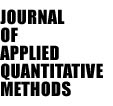 |
|
|||
E-Banking in Developing Economy: Empirical Evidence from Nigeria
Keywords
E-banking, developing economy, empirical evidence, Nigeria
Abstract
This paper empirically examines the impact of e-banking in Nigeria’s economy using Kaiser-Meyar-Olkin (KMO) approach and Barlett’s Test of Sphericity which support the use of factor analysis in order to extract independent variables associated with e-banking. The paper explores the major factors responsible for internet banking based on respondents’ perception on various e-banking applications. It also provides a framework of the factors which are taken to assess the e-banking perception. Due to emergence of global economy, e-business has increasingly become a necessary component of business strategy and a strong catalyst for economic development. E-banking has become popular because of its convenience and flexibility, and also transaction related benefits like speed, efficiency, accessibility, etc. The results of this study shows that e-banking serves several advantages to Nigerian banking sector. The customers (respondents) perception is that e-banking provides convenience and flexible advantages. It also provides transaction related benefits like easy transfer, speedy transaction, less cost and time saving. However, the study shows that the Nigerian customers have security, access, and no enough knowledge regarding e-banking services rendering by banking sector in Nigeria. The study suggest that critical infrastructure like power and telecommunication should be provided and with high level of stability to ensure the application of e-banking in Nigeria. Also, the relative skewed nature of banks location mostly in urban area should be addressed to ensure spread and accessibility by rural dwellers.

